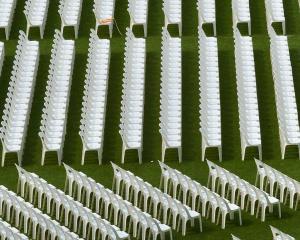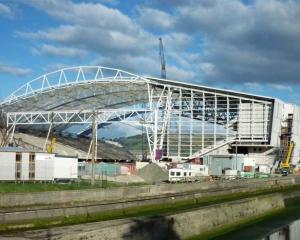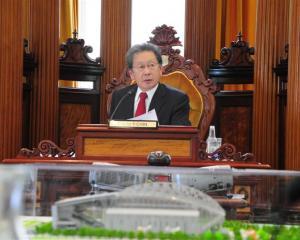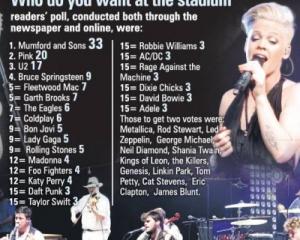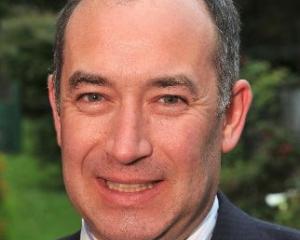The Otago Stadium has received a strong vote of support from the Dunedin City Council with a 10-5 vote to continue the project - subject to conditions.
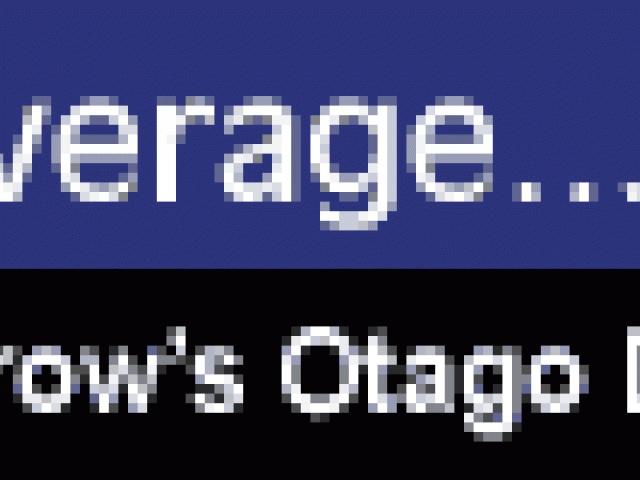
Underwriting of $15 million was required by the trust for money it would receive for seating packages at a later date, and the council would have to continue to look for $20 million it had been unable to find to offset the burden to ratepayers.
The Community Trust of Otago had offered $3 million less than had been asked for, but that was ''still a significant sum''.
Overall, the costs to ratepayers was unchanged, with the average household in Dunedin paying $66 a year for the next 20 years.
Councillors repeated debates they had put forward in the past, with some saying the project was too risky, and others saying the city had to have the project.
Mayor Peter Chin revealed at the start of the meeting of a phone call he received from Deputy Prime Minister Bill English's office at the conclusion of the earlier private deliberations.
Mr English's private secretary was able to confirm that the cabinet was prepared to discuss issues surrounding pursuing the stadium with stadium interests, but that Government funds were under "heavy demand" and any project would have to stack up against others of similar merit, Mr Chin said.
At his post-cabinet press conference today, Prime Minister John Key said the Government had discussed the council's request for help to fund the new sports stadium but hadn't yet reached a decision.
Mr Key said depending on how it was funded, there was a shortfall of about $15 million to $30 million.
"We're taking on board their request and we're considering a package of wider issues," he said.
"At this stage no decision has been reached about whether we will make any contribution or not."
He said other things had to be considered, such as ensuring the Rugby World Cup worked well and the wider context of the development of Otago University.
"In the end, if government made a contribution it would be a modest contribution," he said.
Earlier today, Mr Harland preceded the councillors' debate with a wrap of the work done on the stadium that was somewhat more positive than his report to the council, released last week.
Mr Harland told the meeting most of the resolutions voted for on March 27 last year, and updated later in the year, had been resolved by the trust.
A venue hire agreement had been signed with the Otago Rugby Football Union, and that would remain confidential for the foreseeable future.
A guaranteed maximum price had been agreed to, and the trust and the project delivery team was confident it could be delivered.
The ''big question'' was one of funding.
Underwriting of $15 million was required by the trust for money it would receive for seating packages at a later date, and the council would have to continue to look for $20 million it had been unable to find to offset the burden to ratepayers.
The Community Trust of Otago had offered $3 million less than had been asked for, but that was ''still a significant sum''.
Staff had added that sum to the capital funding to be paid by ratepayers.
Overall, the costs to ratepayers was unchanged, with the average household in Dunedin paying $66 a year for the next 20 years.
Mr Harland said it was now a matter for the council to decide whether to proceed, and if it did, with what terms and conditions.
Mr Farry updated the meeting on seating sales, with the number of lounge memberships contracted rising from 382 to 432, corporate suites from nine to 11, open club reserves from htree to five, and founders club seats from five to six.
That brought the total to $27.7 million, above the target of 27.3 million.
Cr Neil Collins asked if any more work had been done on investigating an upgrade of Carisbrook, but Mr Farry responded that the trust had been told to pursue with ''great vigour'' the roofed stadium, and it would be a council decision if more work was to be done on redeveloping Carisbrook.
Cr Kate Wilson said the income from five-year seating packages should be halved, as they were originally 10-year packages.
Mr Farry said there had been much debate on the issue, but if the facility was not ''superb'', people would have opted out of contracts anyway.
Cr Guest asked if it had been difficult to sell seats when there was not a final decision on the stadium, and was told by Mr Farry there were ''a whole lot of things that will happen positively when we decide to move forward''.
Cr Fliss Butcher questioned why a list of endorsements from groups supporting the stadium project, contained in the report being analysed by councillors, did not include a large concert promoter, and continued her questioning until Mr Chin intervened to stop her.
Mr Farry responded that many of the groups listed had approached the trust, rather than being solicitied.
He gave Cr Butcher "a personal assurance" the multipurpose stadium would attract international concerts and conferences.
CST development director Darren Burden said there were two offers that met the requirement of a guaranteed maximum price, helped by savings identified in the detailed design phase of the project, which were being considered.
For example, a scaled-back design for public concourses had been chosen after it was learned original plans would see the concourses built to a higher standard than those at stadiums in Wellington and Christchurch, Mr Burden said.
Cr Butcher was also given an assurance that staff were working to incorporate an environmental sustainability ethos into the project, although Mr Burden said initiatives would be pursued only to the point they became "cost prohibitive".
Mr Farry confirmed the inability to raise 100% of required private funds in advance, instead relying on annual payments over a period of years, meant additional bridging finance costs, but those additional costs were built into cost projections.
The amount of private financing already raised was an "outstanding" effort, "and it hasn't dried up, it's just starting", Mr Farry said.
"There's a very strong movement out there waiting to see what happens today and on Wednesday."
Earlier, the meeting swiftly moved into a closed-door session as councillors heard from the Carisbrook Stadium Trust about commercially sensitive aspects of the $188 million project.
The meeting started at 10.30am, and members of the public in a packed gallery were quick to make their feelings known.
"People are hungry, we're losing our jobs," a man yelled out, before referring to councillors as poodles.
"How high can you jump, poodles?" the man then shouted.
Mayor Peter Chin said the public-excluded section of the meeting could last two hours.
In a report to today's meeting, council chief executive Jim Harland says funding shortfalls for the stadium could be as high as $35 million.
His report contains the option to "stop the stadium now" or wait until the amount of government funding - if any - is known. - with NZPA

